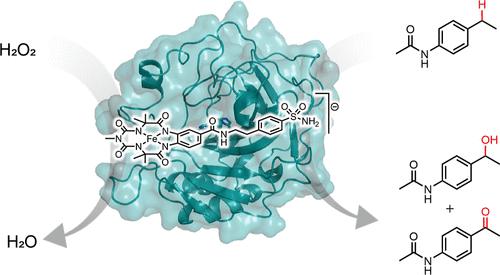Directed Evolution of an Artificial Hydroxylase Based on a Thermostable Human Carbonic Anhydrase Protein
IF 11.3
1区 化学
Q1 CHEMISTRY, PHYSICAL
引用次数: 0
Abstract
The assembly of artificial metalloenzymes (ArMs) provides a second coordination sphere around a metal catalyst. Such a well-defined microenvironment can lead to an enhancement of the activities and selectivity of the catalyst. Herein, we present the development of artificial hydroxylase (ArHase) by embedding an Fe-TAML (TAML = tetraamide macrocyclic ligand) catalyst into a human carbonic anhydrase II (hCAII). Incorporation of the Fe-TAML catalyst ([BS-Fe-bTAML]–) within hCAII enhanced the total turnover number (TTON) for the hydroxylation of benzylic C–H bonds. After engineering a thermostable variant of hCAII (hCAIITS), the resulting ArHase, [BS-Fe-bTAML]–·hCAIITS, was subjected to directed evolution using cell lysates in a 384-well format. After three rounds of laboratory evolution, the best-performing variants exhibited enhancement in the initial rate (124.4 min–1) and in the TTON (2629 TTON) for the hydroxylation of benzylic C–H bonds compared to that of the free cofactor. We surmise that an arginine residue introduced in the course of directed evolution engages in hydrogen bonding with [BS-Fe-bTAML]–. This study highlights the potential of relying on a thermostable host protein to improve the catalytic performance of hCAII-based ArMs.

基于热稳定性人类碳酸酐酶蛋白的人工羟化酶的定向进化
人工金属酶(ArMs)的组装为金属催化剂提供了第二配位层。这种定义明确的微环境可以提高催化剂的活性和选择性。在此,我们介绍了通过将 Fe-TAML(TAML = 四酰胺大环配体)催化剂嵌入人类碳酸酐酶 II(hCAII)而开发的人工羟化酶(ArHase)。在 hCAII 中加入 Fe-TAML 催化剂([BS-Fe-bTAML]-)提高了苄基 C-H 键羟化的总周转次数(TTON)。在设计了 hCAII 的恒温变体(hCAIITS)之后,利用 384 孔格式的细胞裂解液对所产生的 ArHase([BS-Fe-bTAML]--hCAIITS)进行了定向进化。经过三轮实验室进化,与游离辅助因子相比,表现最好的变体在苄基 C-H 键羟化的初始速率(124.4 min-1)和 TTON(2629 TTON)方面都有所提高。我们推测,在定向进化过程中引入的精氨酸残基与[BS-Fe-bTAML]-发生了氢键作用。这项研究强调了依靠可恒温的宿主蛋白来提高基于 hCAII 的 ArM 催化性能的潜力。
本文章由计算机程序翻译,如有差异,请以英文原文为准。
求助全文
约1分钟内获得全文
求助全文
来源期刊

ACS Catalysis
CHEMISTRY, PHYSICAL-
CiteScore
20.80
自引率
6.20%
发文量
1253
审稿时长
1.5 months
期刊介绍:
ACS Catalysis is an esteemed journal that publishes original research in the fields of heterogeneous catalysis, molecular catalysis, and biocatalysis. It offers broad coverage across diverse areas such as life sciences, organometallics and synthesis, photochemistry and electrochemistry, drug discovery and synthesis, materials science, environmental protection, polymer discovery and synthesis, and energy and fuels.
The scope of the journal is to showcase innovative work in various aspects of catalysis. This includes new reactions and novel synthetic approaches utilizing known catalysts, the discovery or modification of new catalysts, elucidation of catalytic mechanisms through cutting-edge investigations, practical enhancements of existing processes, as well as conceptual advances in the field. Contributions to ACS Catalysis can encompass both experimental and theoretical research focused on catalytic molecules, macromolecules, and materials that exhibit catalytic turnover.
 求助内容:
求助内容: 应助结果提醒方式:
应助结果提醒方式:


